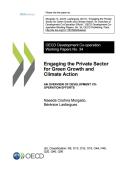
The private sector plays an important role in enabling or hindering green growth in developing countries. With increasing emphasis for development co-operation providers to engage private actors, there is a need for a sound understanding of the theory of change and the efficacy of private sector engagement approaches in supporting environment and development outcomes.
This paper contributes to this agenda and helps inform efforts of development assistance provider. It maps the major approaches used to engage the private sector, i.e. to mobilise private climate investment, promote green private sector development and harness the skills and knowledge from private actors, and highlights some challenges and lessons learned. The paper also provides an estimate of climate-related development finance targeting private sector engagement.
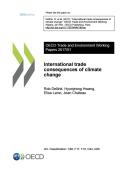
This report provides an analysis of how climate change damages may affect international trade in the coming decades and how international trade can help limit the costs of climate change. It analyses the impacts of climate change on trade considering both direct effects on infrastructure and transport routes and the indirect economic impacts resulting from changes in endowments and production. A qualitative analysis with a literature review is used to present the direct effects of climate change. The indirect impacts of climate change damages on trade are analysed with the OECD’s ENV-Linkages model, a dynamic computable general equilibrium model with global coverage and sector-specific international trade flows. By building on the analysis in the OECD (2015) report "The Economic Consequences of Climate Change", the modelling analysis presents a plausible scenario of future socioeconomic developments and climate damages, to shed light on the mechanisms at work in explaining how climate change will affect trade.
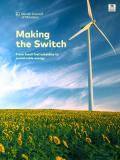
This report estimates fossil fuel subsidies to be around USD 425 billion. Such subsidies represent the large lost opportunities for governments to invest in renewable energy, energy efficiency and sustainable development. Removal of subsidies can lead to carbon emission reductions (6~8% by 2050 globally), Reductions that can be improved further with a switch or a "SWAP" towards sustainable energy.
This report describes the scale and impact of fossil fuel subsidies on sustainable development. It describes the SWAP concept to switch savings made from fossil fuel subsidy reform, towards sustainable energy, energy efficiency and safety nets. The report provides potential SWAP outlines for Bangladesh, Indonesia, Morocco and Zambia. "Making the Switch" was written for the Nordic Council Ministers by the Global Subsidies Initiative of IISD and Gaia Consulting.
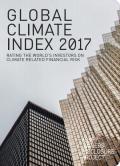
The world’s biggest investors are responding to the global commitment to tackle climate change and are rapidly scaling up action to protect their portfolios, reveals this annual benchmark report on the industry from the Asset Owners Disclosure Project
The fifth AODP Global Climate 500 Index launches after a year of rapid developments in articulating the financial risks of climate change to the global economy. Climate risk rose further up the investor agenda in 2016. The Paris Climate Agreement came into force in November, including a recognition that financial flows must be aligned with the commitment to keep climate change well below 2C. Regulatory change is on the agenda, with France implementing a worldfirst mandatory climate risk disclosure requirement for institutional investors and the Task Force on Climate-related Financial Disclosures delivering its recommendations to the Financial Stability Board, for consideration by the G20 in July this year. The scales have tipped – a 60% majority of Asset Owners, and half of Asset Managers are now taking action to manage the risks and opportunities posed by climate change.
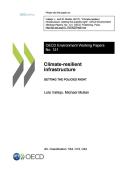
Climate change will affect all types of infrastructure, including energy, transport and water. Rising temperatures, increased flood risk and other potential hazards will threaten the reliable and efficient operation of these networks, with potentially large economic and social impacts. Decisions made now about the design, location and operation of infrastructure will determine how resilient they will be to a changing climate.
This paper provides a framework for action aimed at national policymakers in OECD countries to help them ensure new and existing infrastructure is resilient to climate change. It examines national governments’ action in OECD countries, and provides recent insights from professional and industry associations, development banks and other financial institutions on how to make infrastructure more resilient to climate change.
